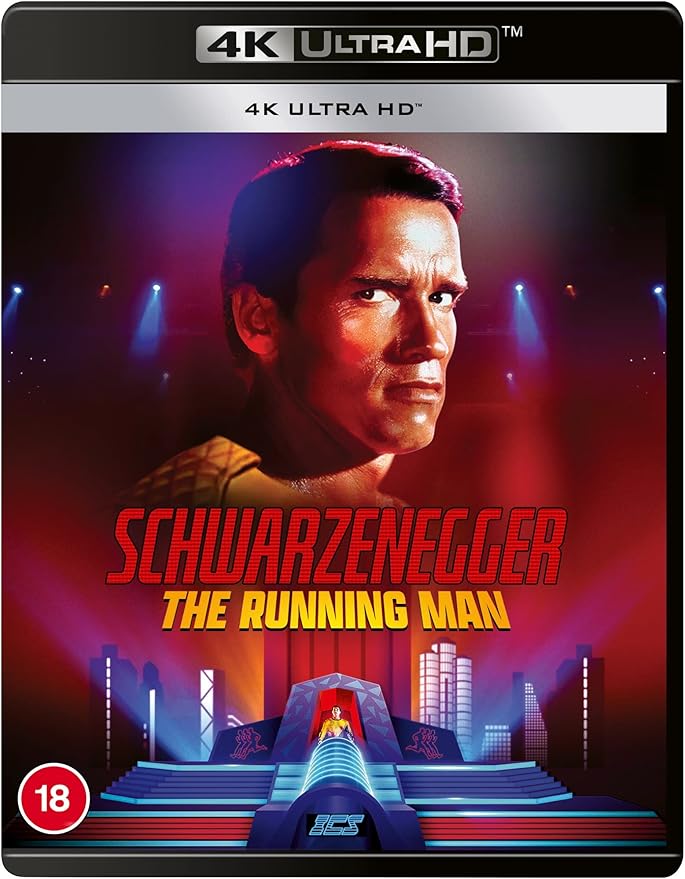When I first sat down to watch “The Running Man,” I knew I was in for a wild ride. Released in 1987 and directed by Paul Michael Glaser, this film is a fascinating blend of science fiction, action, and dark comedy, with a storyline that feels eerily relevant even today. Based on Stephen King’s novel (written under the pseudonym Richard Bachman), the film paints a dystopian world where entertainment takes center stage, and human lives are mere pawns in a deadly game.
The film stars Arnold Schwarzenegger as Ben Richards, a former police officer falsely accused of a massacre. After escaping imprisonment, he finds himself coerced into participating in a brutal game show called The Running Man. The premise is simple: participants must evade ruthless “Stalkers” while the whole thing is broadcast live for the entertainment of a television-savvy audience. As I watched, I couldn’t help but draw parallels to modern reality TV shows and the lengths to which people go for fame and fortune.
One of the most striking elements of The Running Man is its critique of media sensationalism and the desensitization of society. In an era where reality TV and streaming services dominate, the film’s portrayal of a society obsessed with violence and entertainment feels hauntingly prescient.
The Role of Technology
The film’s depiction of technology is crucial to understanding its themes. The futuristic setting is loaded with gadgets and media capabilities that echo today’s reality. From the omnipresent surveillance to the flashy game show elements, “The Running Man” serves as a cautionary tale about the potential consequences of our entertainment choices.
Satire and Humor
While the film is undeniably intense, it also employs a sharp sense of humor. The over-the-top characters and exaggerated situations provide comic relief, making the film an entertaining experience. The character of Richard Dawson, played by game show legend Richard Dawson himself, is particularly memorable. His charm juxtaposed with the sinister nature of the game creates a fascinating dynamic that kept me engaged throughout.
Character Development
Schwarzenegger’s portrayal of Ben Richards is both heroic and relatable. His transformation from a wrongfully accused man to a figure of rebellion against a corrupt system captures the essence of a classic action hero. The supporting cast, including Maria Conchita Alonso as Amber Mendez and Yaphet Kotto as Captain Freedom, adds depth to the film, providing various perspectives on the issues presented.
A Villain for the Ages
Dawson’s character, Damon Killian, stands out as a quintessential antagonist. His slick demeanor and ruthless demeanor make him a formidable foe, embodying the very essence of the entertainment industry gone awry. The interplay between Killian and Richards drives much of the film’s tension, making their confrontations thrilling to watch.
Cinematic Techniques
From a technical standpoint, The Running Man employs various cinematic techniques that enhance the viewing experience. The film’s pacing is brisk, with action sequences that keep viewers on the edge of their seats. The vibrant color palette, combined with the futuristic set designs, helps immerse the audience in its dystopian world.
Action Sequences
The action scenes are a highlight of the film. They are choreographed with precision, showcasing Schwarzenegger’s physical prowess while maintaining a sense of urgency. The chase sequences, especially, are exhilarating and serve to heighten the stakes for Richards and his fellow contestants.
Special Effects
While some of the special effects may seem dated by today’s standards, they still hold a certain charm. The practical effects used in the film contribute to its gritty feel, making it a nostalgic experience for viewers who appreciate the artistry of filmmaking before the advent of CGI.
Cultural Impact
The Running Man has left an indelible mark on pop culture since its release. Its tagline, “The Game is Life,” has become a part of the lexicon, often referenced in discussions about entertainment and societal values. The film’s exploration of themes such as authoritarianism and media manipulation continues to resonate, prompting conversations about the ethical implications of reality television and the role of technology in our lives.
Influence on Future Films
The film’s influence can be seen in various modern works, particularly in the dystopian genre. Films like The Hunger Games and shows like Black Mirror echo the themes of The Running Man, exploring the intersection of entertainment and morality. This connection demonstrates the film’s relevance over the decades, proving that its commentary is as pertinent today as it was in the late ’80s.
Conclusion
In conclusion, The Running Man is more than just an action-packed thriller; it is a thought-provoking commentary on society’s relationship with entertainment and technology. As I reflect on my viewing experience, I appreciate the film’s ability to entertain while simultaneously encouraging critical thought about the world we live in. Whether you’re a fan of Arnold Schwarzenegger, science fiction, or just a good old-fashioned action movie, The Running Man is a must-watch.
As we navigate our own reality filled with relentless media consumption and a growing thirst for sensationalized content, I encourage you to revisit this classic. It serves as a reminder that while entertainment can be thrilling, it also comes with significant societal implications.
<iframe width="560" height="315" src="https://www.youtube.com/embed/pkAN5rGGP1M?si=aIq2CuW-ZS_iZhc2" title="YouTube video player" frameborder="0" allow="accelerometer; autoplay; clipboard-write; encrypted-media; gyroscope; picture-in-picture; web-share" referrerpolicy="strict-origin-when-cross-origin" allowfullscreen></iframe>




.jpg?w=100&resize=100,70&ssl=1)
